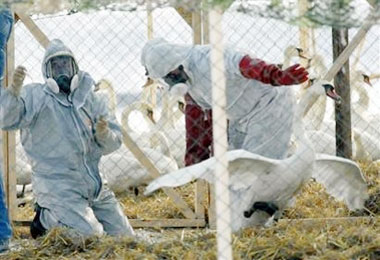|
Bird flu expands in Africa, Asia
(AP)
Updated: 2006-03-13 13:14
YAOUNDE, Cameroon - The deadly H5N1 strain of bird flu was detected for the
first time in poultry in Myanmar and Cameroon, officials in the two nations
said, in the latest sign of the disease's expanding range in Africa and
Southeast Asia.
Experts over the weekend confirmed cases in hundreds of dead chickens at a
farm outside of Myanmar's second largest city, Mandalay, Than Tun, director of
the country's livestock breeding and veterinary department, said Monday.

Emergency service
workers lock up a swan flock in a special cage on the banks of the Vistula
river in Torun, northern Poland, where five dead swans were found since
last week, Friday, March 10, 2006. All the swans from the flock will be
tested for the H5N1 strain of bird flu, as a lab confirmed that four of
the dead swans were infected. [AP] | Myanmar
borders Thailand and China, which together have reported 24 human deaths from
the disease.
Cameroon's government announced its first avian case on Sunday, becoming the
fourth African country to be struck by the deadly bird flu virus.
The fatal virus was first discovered in Africa on a commercial poultry farm
in Nigeria in February. It has since been reported in Niger and Egypt.
Experts have expressed concern that bird flu was likely to be spreading
undetected in Africa, which is ill-prepared to deal with the virus and lacks
laboratories to detect it.
Cameroon's government said the tests that confirmed the H5N1 strain were
carried out in a laboratory in Paris.
Minister of Livestock Aboubakary Sarki told reporters the infected duck was
among 10 birds that died in Maroua from Feb. 12-26. He said the government had
already slaughtered birds in the area as a precaution, but did not say how many.
Sarki said the government had banned the sale of chicken in the affected
area, but some residents contacted by phone said it was still being sold.
Cameroon also said it was reinforcing a ban on poultry imports from Nigeria
and any other country affected by bird flu. Authorities imposed the ban shortly
after the fatal strain was reported in Nigeria.
The H5N1 strain of bird flu has killed or forced the slaughter of more than
140 million chickens and ducks across Asia since 2003, and has recently spread
to Europe, Africa and the Middle East. Health officials fear H5N1 could evolve
into a virus that can be transmitted easily between people and become a global
pandemic.
At least 97 people have died from the disease worldwide, two-thirds of them
in Indonesia and Vietnam, according to the World Health Organization. No human
cases have been detected in Africa.
Humans and poultry live close together on small farms across Africa, as in
Asia where the current H5N1 wave began and where the virus first jumped to
humans.
In Myanmar, teams of experts were sent to the area to begin slaughtering
chickens within a two-mile radius of the farm where the infected birds were
found.
Myanmar's military government 錕斤拷 which generally restricts the free flow of
information and exercises tight control over the mostly state-owned mass media 錕斤拷
had previously said it would deal openly with any bird flu problems.
|